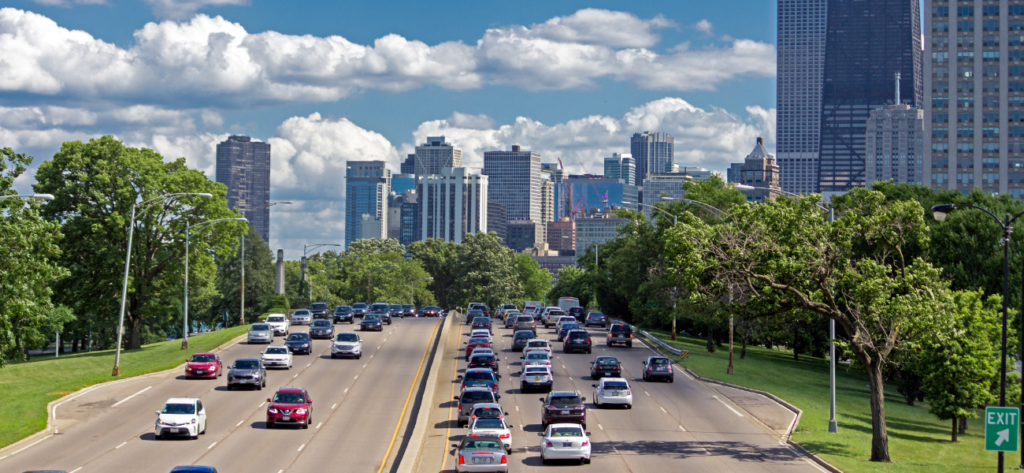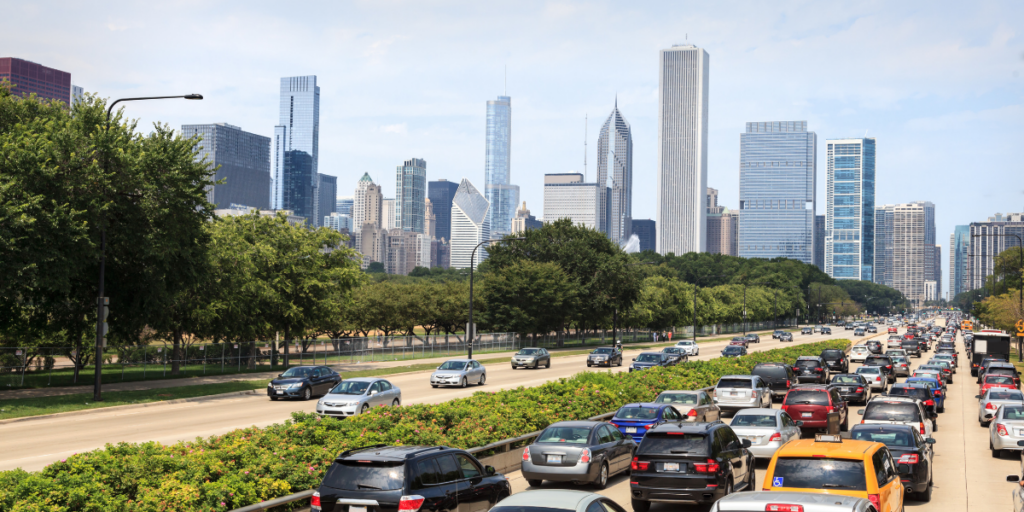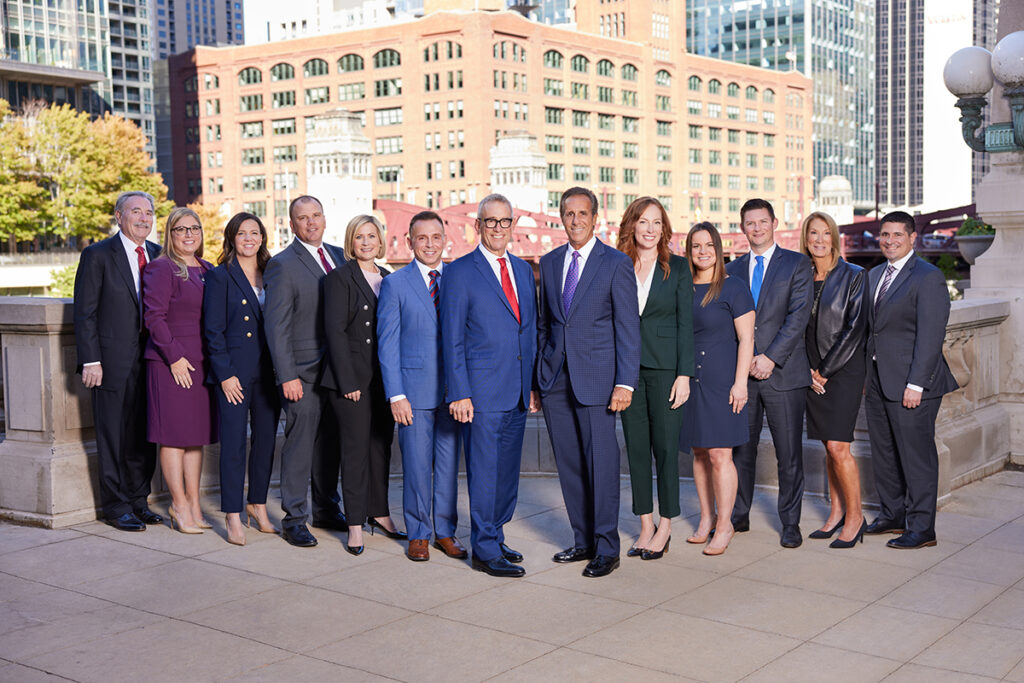Chicago Car Accident Lawyer
Our team of car accident lawyers is determined to hold negligent people responsible for their actions and the harm they caused others. At Levin & Perconti, we will never settle a case for anything less than it’s worth.
- Common Causes of Car Accidents in Chicago
- Types of Car Accidents in Chicago
- Types of Injuries
- Determining fault in a Chicago Car Accident
- Can I Still Collect Compensation if I Was Partly at Fault?
- How Much Is My Chicago Car Accident Claim Worth?
- How Long Do I Have to File a Lawsuit After a Car Accident in Illinois?
- How Can the Personal Injury Attorneys at Levin & Perconti Help Me?
Hundreds of thousands of drivers occupy the roads of Chicago and Cook County every day. That puts everyone who drives at increased risk of getting into an accident as they head from one destination to the next. According to the Illinois Department of Transportation (IDOT), the total number of crashes in Cook County in 2021 was 156,289.
Also included in that number are 285 fatal crashes and 30,337 crashes that resulted in injury. Six hundred fifty-seven people are killed throughout Illinois due to alcohol-related crashes, although the exact numbers for Cook County aren’t available.
Cook County covers a large geographical area and an average of 430 accidents a day represents a relatively small percentage of the total vehicles on the road. However, only looking at the odds of an accident occurring overlooks the actual severity of the problem.
Getting into an auto accident in Cook County sets in motion a series of events that can severely impact your life. An accident can rob you of your ability to live a normal life and burden you with medical bills that you wouldn’t otherwise have. You could suffer from loss of income, temporary or permanent disfigurement, pain and suffering from the injuries you sustained, and permanent damage to your car.
The following will provide an overview of car accidents in Chicago, and explain why you should contact a car accident attorney after a motor vehicle accident.
Common Causes of Car Accidents in Chicago
Drivers are human and aren’t always on their best driving behavior, and this negligence can frequently lead to collisions. Weather is another common cause of car accidents; many new drivers in Chicago are unfamiliar with driving in slick and snowy conditions, and don’t always make the best decisions when behind the wheel of a car.
Speeding is another common cause of accidents in Chicago because the average speed limit is 30 mph throughout the city. The fact is, drivers regularly ignore the posted speed limit, and drivers who speed in areas with multiple stop signs and lights put themselves at risk of an accident by not stopping on time.
Drunk driving is another frequent cause of accidents, even though Chicago is rich in public transportation options. The laws for drunk driving in Illinois are harsh, yet some people still decide to get behind the wheel of a car while under the influence instead of calling a cab.
Types of Car Accidents in Chicago
Another issue drivers face when driving in the city is that the yellow lights only last about three seconds, and many intersections in Chicago and Cook County have red-light cameras. These conditions increase the risk of the following types of collisions including:
- Rear-end crashes
- Side-impact or T-bone collisions
- Single-vehicle crashes
- Uber and Lyft accidents
Rear-end crashes
Chicago drivers face an increased risk of getting into a rear-end crash due to red-light cameras and short yellow lights. Red-light camera tickets cost $100 per violation. A driver who doesn’t want to get ticketed may stop quickly at a yellow light to avoid getting ticketed. An inattentive driver who’s following too closely, a common driving habit in Chicago, puts themselves at risk of rear-ending the driver in front of them.
Side-impact/T-bone crashes
Most of the intersections in and around Chicago are at right angles adjacent to one another, and not all have good visibility. It is more likely to have a side-impact or T-bone collision in a Chicago intersection due to a driver ignoring their red light or a poorly marked and signaled intersection.
Single-vehicle crashes
A single-vehicle crash is another common type of accident in Chicago. A driver trying to make a left turn can get run off the road by an oncoming car and collide with parked cars. Icy streets that haven’t been salted can sometimes make it harder to stop on time and slide into parked cars or a street light.

Types of Injuries
A car accident in Chicago is likely to result in two types of injury. The Illinois Department of Transportation classifies these injuries as incapacitating and non-incapacitating injuries. Here’s what you should know about both categories of injury.
Incapacitating injuries
An incapacitating injury, also known as an a-injury, is any type of non-fatal injury that prevents an injured person from walking, driving, or normally engaging in the activities they were capable of before they sustained the injury. Incapacitating injuries include broken limbs, severe lacerations, spinal cord injuries, abdominal injuries, skull fractures, brain injuries, and chest injuries.
Non-incapacitating injuries
A non-incapacitating injury, known as a b-injury, is any injury other than a fatal or incapacitating injury that is evident to observers at the scene of the crash. The injuries include abrasions, bruises, minor lacerations, and head lumps.
Determining fault in a Chicago Car Accident
Determining who bears responsibility in an accident is the first step towards recovering damages. The law assigns blame on a 0-100% scale, and the actual percentage placed on the drivers involved in the accident depends on the evidence collected afterward. Evidence helps your lawyer determine the amount of fault assigned to the negligent driver and ensure proper compensation.
Multiple sources can provide accident evidence, including the police report. A police officer called to the accident scene will look over the scene and write an accident report based on their observations. They may also take pictures of the scene to support their report and issue a citation to the offending driver if warranted. These photos of the accident scene can also help show the cause of the accident.
Medical bills are another type of evidence that helps with determining fault. It’s important to keep copies of all medical bills related to the accident. That includes bills related to ongoing care, even if you’ve initially healed from your injuries.

Can I Still Collect Compensation if I Was Partly at Fault?
Yes, it is still possible to collect compensation if you were partly at fault. Illinois uses a modified comparative negligence standard to recover damages after an accident, which affects how much compensation you can seek.
Comparative negligence assigns a percentage of blame to each driver in a car accident. For example, one driver speeds through a red light and gets hit by another car proceeding normally through their green light. Depending on the circumstances, the driver who ignored the red light may bear 100% of the blame, with the other driver receiving no blame at all.
Police are allowed to use their discretion and judgment to issue a ticket as they see fit when responding to auto accidents.
In any case, you should contact a personal injury lawyer in Chicago to evaluate the accident and help determine if you have a case.
How Much Is My Chicago Car Accident Claim Worth?
All car accidents create a unique set of circumstances that make it difficult to determine how much your accident is worth. The amount of a personal injury claim following an accident is based on:
- Economic damages
- Non-economic damages
- Punitive damages
Economic damages
Economic damages cover financial losses you experienced after the accident. That includes wages, the value of your car, medical bills, and any other income that you would otherwise earn had you not gotten into the accident.
Non-economic damages
Non-economic damages do not have an assignable value like lost wages or medical bills. However, you can still ask to be compensated for these damages because the accident has affected your ability to live the life you had before the accident.
Punitive damages
Illinois law allows a plaintiff to ask for punitive damages in certain cases where the offender acted with extreme carelessness or recklessness. You might be able to ask for punitive damages if the driver was intoxicated at the time of the accident.
You should contact a Chicago personal injury lawyer today to help determine if you are eligible for compensation for your injuries and economic losses.
How Long Do I Have to File a Lawsuit After a Car Accident in Illinois?
According to section 735 ILCS 5/13-202 of Illinois’ code of Civil Procedure, you have up to two years from the car accident date to file a lawsuit for personal injury in Illinois and a five-year limit for damage private property. There are few exceptions to this rule, so it’s important to contact a personal injury lawyer as soon as possible after a car accident to avoid missing the deadline and your chance to receive compensation for your damages.

How Can the Personal Injury Attorneys at Levin & Perconti Help Me?
An attorney ensures that you will receive maximum compensation for your case. The personal injury attorneys at Levin & Perconti have 200+ years of combined experience and are nationally recognized for their success. We never settle for less than fair compensation and are not afraid to take cases to trial. We have successfully recovered more than a billion dollars in settlements and verdicts, including a number of record results. Some of our successful vehicle accident cases include:
$10 million
Settlement
for a 5-year-old boy run over by a fire truck as he played on a fire hydrant, resulting in the loss of his leg and half of his pelvis
$3.8 million
Settlement
on behalf of a 61-year-old man who was struck by a vehicle while cycling in Lake County.
$2.07 million
Verdict
for a 23-year-old woman who suffered multiple leg fractures in an automobile accident
Settlement
for a 77-year-old woman who lost a part of her right leg after being struck by a bus.
Contact Levin & Perconti today or use our contact form for a free consultation with a Chicago personal injury lawyer. We’re committed to protecting our clients’ rights after being seriously injured by the negligence of others.
Testimonials
Legally Reviewed by

John J. Perconti
Contact Us
- Free Consultation
- (312) 332-2872
"*" indicates required fields
Notable Results
SETTLEMENT
for a 5-year-old boy run over by a fire truck as he played on a fire hydrant, resulting in the loss of his leg and half of his pelvis
SETTLEMENT
for the family of a 32-year-old woman who was killed when their pick-up truck was rear-ended by a semi-truck
VERDICT
for a 23-year-old woman who suffered multiple leg fractures in an automobile collision
Our Office
325 N LaSalle Dr Suite 300
Chicago, IL 60654
312-332-2872